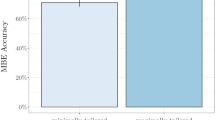Abstract
Three groups of college students were given instructions using different testing techniques to determine whether the superior performance obtained with Programmed Student Achievement (PA) was due to a Hawthorne Effect. PA students, operating under the consequence of failing the course if they failed to evidence criterion performance (100% mastery) on weekly quizzes, exhibited superior performance, relative to control groups, on the weekly quizzes and on an unannounced retention test. The results seem to preclude any attempt to interpret the effectiveness of Programmed Student Achievement on the basis of a Hawthorne Effect.
Similar content being viewed by others
References
Knight, J. M. (1973). The effect of programmed achievement on student performance. Journal of Educational Research 66(7): 291–294.
Knight, J. M., Williams, J. D., and Jardon, M. (1975). The effects of contingency avoidance on programmed student achievement. Research in Higher Education, 3: 11–17.
Nation, J. R., Knight, J. M., Lamberth, J., and Dyck, D. G. (1974). Programmed student achievement: A test of the avoidance hypothesis. Journal of Experimental Education (in press).
Whaley, D. L., and Malott, R. W. (1971). “Elementary Principles of Behavior.” New York: Appleton-Century-Crofts.
Author information
Authors and Affiliations
Rights and permissions
About this article
Cite this article
Haddad, N.F., Nation, J.R. & Williams, J.D. Programmed student achievement: A Hawthorne Effect?. Res High Educ 3, 315–322 (1975). https://doi.org/10.1007/BF00991248
Issue Date:
DOI: https://doi.org/10.1007/BF00991248




